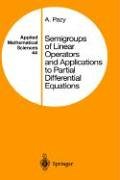Semigroups of Linear Operators and Applications to Partial Differential Equations (Applied Mathematical Sciences)

| Author | : | |
| Rating | : | 4.15 (504 Votes) |
| Asin | : | 0387908455 |
| Format Type | : | paperback |
| Number of Pages | : | 279 Pages |
| Publish Date | : | 2013-07-05 |
| Language | : | English |
DESCRIPTION:
Pazy's decision to give a connected account of the applications to partial differential equations in the last two chapters was a particularly happy one, since it enables one to see what the theory can achieve much better than would the insertion of occasional examples. In my opinion Pazy has done an outstanding job in presenting both the abstract theory and basic applications in a clear and interesting manner. From the reviews: "Since E. Hille and K. Moreover, the fact that mathematically this abstract theory has many direct and important applications in partial differential equations enhances its importance as a necessary discipline in both functional analysis and differential equations. The choice and order of the material, the clarity of the proofs, and
Carlos N. Rautenberg said The content is optimal, the printing is poor. Although the book is a compilation of class notes, it is very well written, and suitable for the level of a second or third year graduate student. The only needed background is strong foundation on functional analysis. The author explain very well how semigroups become the state of the art for applied mathematicians.On the other side, the printing of the book is very poor, the letters actually tend to disapear in several pages and I'm not the only that went thru this.
This book presents that theory and its basic applications, and the last two chapters give a connected account of the applications to partial differential equations.. Since the characterization of generators of C0 semigroups was established in the 1940s, semigroups of linear operators and its neighboring areas have developed into an abstract theory that has become a necessary discipline in functional analysis and differential equations
